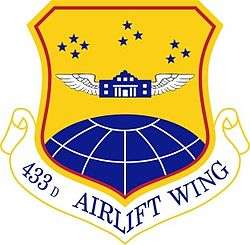433d Operations Group
| 433d Operations Group | |
|---|---|
|
Emblem of parent 433d Airlift Wing | |
| Active | 1943-1946; 1947-1952; 1955-1959; 1992--present |
| Country | United States |
| Branch | United States Air Force |
The 433d Operations Group (433 OG) is the operational flying component of the United States Air Force Reserve 433d Airlift Wing. It is stationed at Lackland Air Force Base, Texas.
The unit's World War II predecessor unit, the 433d Troop Carrier Group operated primarily in the Southwest Pacific Theater transporting such things as gasoline, ammunition, medicine, rations, communications equipment, construction materials and evacuating wounded personnel during numerous campaigns. It was awarded the Philippine Presidential Unit Citation for its role in the liberation of the Philippines during 1944-1945. After the war, the unit served in the reserves and was elevated to active service during the Korean War. It returned to reserve duty until its inactivation in 1959; then again since 1992 after its reactivation.
Overview
The 433 OG operates two flying squadrons with a total of 6 Lockheed C-5A Galaxy strategic airlift aircraft, transporting personnel and cargo on a worldwide basis. Component squadrons are:
- 68th Airlift Squadron
- 356th Airlift Squadron
- 733rd Training Squadron
- 433d Aeromedical Evacuation Squadron
- 433d Airlift Control Flight
- 433d Operations Support Squadron
History
- For additional lineage and history, see 433d Airlift Wing
Trained to tow gliders and to transport and drop supplies and paratroops, February–July 1943. Air echelon flew Group's C-47s to New Guinea, via Hawaii, the Fiji Islands, and Australia, August–September 1943, and began operations with Fifth Air Force. Ground echelon sailed from the West Coast on 25 September 1943, arriving in Australia on 10 October 1943. By early November 1943, the two echelons had rejoined at Nadzab, New Guinea.
Transported troops and carried cargo, such as gasoline, ammunition, medicine, food, equipment, and construction materials; and evacuated wounded personnel. From November 1943 to February 1945, the group was assigned six troop carrier squadrons, rather than the more normal four. Lost operational control of two squadrons, July–November 1944. Squadrons moved, October 1944-January 1945, to Biak Island, and January–February 1945 to the Philippines.
Operations in the Philippines included delivering ammunition, food, and other items to Filipino guerrilla forces; evacuating former allied prisoners of war and civilian internees; transporting combat units from New Guinea, the Netherlands East Indies, and the Solomon Islands. Group flew its one combat glider tow mission on 23 June 1945 to Aparri, Luzon. Transported troops to Okinawa, June–August 1945 and occupation forces to Japan after V-J Day.
Activated as a Reserve organization in Ohio on 6 July 1947. Ordered to active service and moved to North Carolina in October 1950; received C-119 aircraft the following month. Tactical training began in March 1951. Transported personnel and supplies to Army units in the field. Airdropped personnel and equipment during army exercises. Moved to West Germany and participated with US, British, and French units in field training until inactivated. By 1958, flew airlift missions and participated in tactical exercises.
Beginning August 1992, the group participated in airlift missions worldwide, including numerous humanitarian missions.
Lineage
- Established as 433d Troop Carrier Group on 22 January 1943
- Activated on 9 February 1943
- Inactivated on 15 January 1946
- Activated in the Reserve on 6 July 1947
- Redesignated 433d Troop Carrier Group, Medium on 27 June 1949
- Ordered to active service on 15 October 1950
- Inactivated on 14 July 1952
- Activated in the Reserve on 18 May 1955
- Inactivated on 14 April 1959
- Redesignated: 433d Tactical Airlift Group on 31 July 1985 (Remained inactive)
- Redesignated: 433d Operations Group on 1 August 1992
- Activated in the Reserve on 1 August 1992.
Assignments
|
|
Components
- 5th Troop Carrier Squadron: 28 October 1948 – 28 March 1949
- 65th Troop Carrier Squadron: 9 November 1943 – 20 February 1945
- 66th Troop Carrier Squadron: 9 November 1943 – 20 February 1945
- 67th Troop Carrier Squadron: 9 February 1943 – 15 January 1946 (detached July–November 1944); 6 July 1947 – 14 July 1952; 18 May 1955 – 14 April 1959
- 68th Troop Carrier (later 68th Airlift) Squadron: 9 February 1943 – 15 January 1946; 3 August 1947 – 14 July 1952; 18 May 1955 – 14 April 1959; 1 August 1992–present.
- 69th Troop Carrier Squadron: 9 February 1943 – 15 January 1946; 3 August 1947 – 14 July 1952; 25 March 1956 – 14 April 1959
- 70th Troop Carrier Squadron: 9 February 1943 – 15 January 1946 (detached July–November 1944); 3 August 1947 – 3 October 1950
- 315th Troop Carrier Squadron: 28 October 1948 – 28 March 1949.
- 356th Airlift Squadron, 9 Jan 2007 – present
Stations
|
|
Aircraft
|
|
References
![]() This article incorporates public domain material from the Air Force Historical Research Agency website http://www.afhra.af.mil/.
This article incorporates public domain material from the Air Force Historical Research Agency website http://www.afhra.af.mil/.
- Maurer, Maurer, ed. (1983) [1961]. Air Force Combat Units of World War II (PDF) (reprint ed.). Washington, DC: Office of Air Force History. ISBN 0-912799-02-1. LCCN 61060979.
- Maurer, Maurer, ed. (1982) [1969]. Combat Squadrons of the Air Force, World War II (PDF) (reprint ed.). Washington, DC: Office of Air Force History. ISBN 0-405-12194-6. LCCN 70605402. OCLC 72556.
- Ravenstein, Charles A. (1984). Air Force Combat Wings, Lineage & Honors Histories 1947-1977 (PDF). Washington, DC: Office of Air Force History. ISBN 0-912799-12-9.


.svg.png)
.jpg)